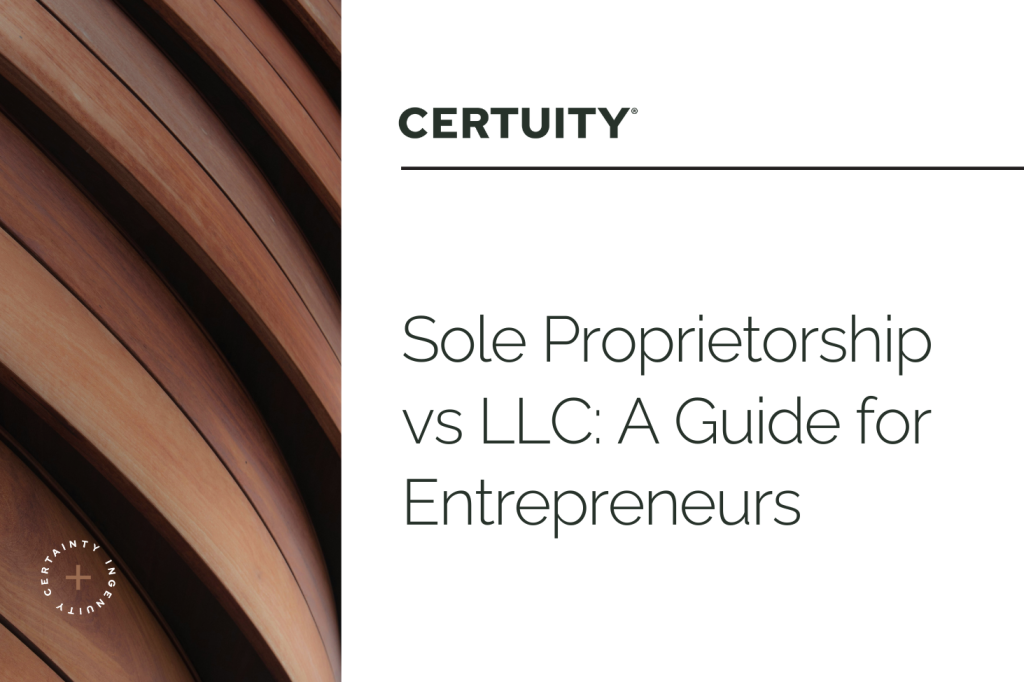
Key Takeaways
- A sole proprietorship is a business structure where one person owns and operates the business and there’s no legal separation between the business owner and their business.
- While sole proprietorships offer simplicity and lower startup costs, business owners are liable for any debts or legal issues.
- LLCs are more complex and expensive to set up but they provide liability protection and greater tax flexibility, which becomes especially important as they scale their business.
- Sole proprietors should consider investing in liability insurance or transitioning to an LLC as their business grows for added protection and flexibility.
Choosing the right business structure is crucial for entrepreneurs, as it impacts legal responsibilities, taxation, and financial security. A sole proprietorship is the simplest and most common business type, offering full control and minimal setup requirements. However, it has drawbacks, particularly regarding financial and legal protections.
In this guide, we’ll cover the legal, tax, and other important aspects of sole proprietorships, and compare them with LLCs to help you make an informed decision.
What is a Sole Proprietorship?
A sole proprietorship is a business structure where one person owns and operates the business. Unlike an LLC or corporation, there’s no legal separation between you and your business. This means business owners are personally responsible for profits, debts, and legal issues.
This structure is particularly popular among freelancers, consultants, and small business owners due to its ease of setup and direct operational control.
Key Features
- Simple Formation – A sole proprietorship requires minimal registration, often limited to registering a business name or obtaining a local business license. This simplicity makes it an ideal choice for entrepreneurs seeking to start a business quickly and inexpensively.
- Direct Control – Owners get to make all the decisions, without the need for corporate governance. This autonomy can be a significant advantage but also means the entire responsibility rests on the owner’s shoulders.
- Pass-Through Taxation – Owners report business income on their personal tax return, which simplifies the process and helps them avoid the double taxation that corporations face.
- Unlimited Liability – Owners are personally responsible for any debts or legal issues. If the business faces lawsuits or financial difficulties, personal assets, like a home or their savings, may be at risk.
How to Establish a Sole Proprietorship
1. Choose a Business Name – If you want to operate under a name other than your legal name, you’ll need to register a “Doing Business As” (DBA) name.
2. Obtain Necessary Licenses and Permits – Check local, state, and industry-specific regulations to ensure you’re compliant with industry-specific requirements.
3. Apply for an EIN (if required) – While not always necessary, an Employer Identification Number (EIN) is needed if hiring employees.
4. Open a Business Bank Account – Keeping personal and business finances separate simplifies tax filing and adds credibility to your business.
Sole Proprietorship vs. LLC
While sole proprietorships offer simplicity and lower startup costs, LLCs provide liability protection and greater tax flexibility.
An LLC, or limited liability company, is a business structure in which members are not personally liable for the company’s debts. An LLC shields personal assets from business debts and allows owners to choose how their income is taxed, potentially lowering their overall tax burden. If a business owner expects their business to grow or operate in a higher-risk industry, forming an LLC could offer long-term benefits.
- Liability Protection: Unlike a sole proprietorship, an LLC offers limited liability, protecting the owner’s personal assets from business debts and legal issues.
- Tax Flexibility: An LLC can choose its tax structure, allowing owners to opt for pass-through taxation or taxation as a corporation, which can provide possible tax benefits. Sole proprietorships are automatically taxed as pass-through entities.
- Ease of Formation and Costs: Sole proprietorships are simpler and less expensive to set up than LLCs. However, LLCs provide added protections, making them more suitable for businesses anticipating growth or those in higher-risk industries.
Legal and Financial Considerations
Operating as a sole proprietor comes with significant financial and legal responsibilities. Since there is no legal separation between the business and the owner, personal assets could be at risk in the event of lawsuits or debt obligations. Additionally, funding options may be limited, as banks and investors typically prefer businesses with a formal legal structure.
To protect their financial interests, sole proprietors should invest in liability insurance, maintain accurate financial records, and plan for future growth. If the business scales, transitioning to an LLC can provide added legal protection and financial flexibility. Seeking advice from a financial advisor can help you navigate this transition smoothly.
Summary
A sole proprietorship is an attractive option for small business owners seeking a straightforward and cost-effective business structure. However, the risks associated with unlimited liability and limited funding opportunities should be carefully weighed. Make sure your choice of business structure fits your long-term goals, and think about ways to protect your finances as your business grows..